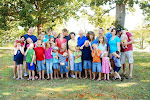Why Teach Little People To Do Chores?
In my first laundry post I wrote a little about using the time in a child's life when they greatly desire to help and find helping to be fun as the perfect time to be training them in doing chores. You will never find another time in the child’s life when they will be so happy to learn and do chores as when they are 18 months—4/5 years old. It does take some thought and planning at first. It will take more of your time, mothers. You will be learning patience, dads. You will have to sacrifice a little in the “now” in order to reap the harvest in the future.
Our children are an investment. We invest blood, sweat and tears into their growth and development, hopeful to produce an adult not only ready to join society, but one that will be a blessing to all around him/her and seeks to serve the Lord and the world around him/her. As parents we need to always be future minded in our parenting. Just as we might make an investment that will bring dividends years in the future, so it is with training little ones while they are young.
Chores are a medium for teaching our children a lot more than how to wash dishes or fold laundry. These are important life skills everyone should at least know how to do, even if they don’t need to do them on a regular basis as adults. It would be very short sighted if we thought of chores only as a way to keep the house clean. Children learn work ethics, working together, working for a common goal and working to provide.
2 Thessalonians 3:10 “For even when we were with you, we would give you this command: If anyone is not willing to work, let him not eat.”
Other benefits include learning to get along with others, working for the common good of the family and fostering the child's place in society and the family. They have a place. They have purpose. They have goals.
An excellent article in the recent edition of “No Greater Joy” magazine demonstrates how all these facets of training, chores and discipline all come together. Here is the focal part of the article:
“There is nothing worse on a child’s self esteem than to be treated as one not yet ready to join the human race. When you don’t give children a focus, they focus on themselves—a most unhappy condition. When Gracie is rebuked or sp*nked for not obeying, she sometimes gets upset—emotionally wrought. At that point her parents find it difficult to communicate with her. She is no doubt thinking how mistreated she is, how deprived. She wanted her way—some forbidden pleasure—and “the big guys” are again constraining her to a behavior she would never choose for herself. There is a danger at this point that the child will succumb to a willful desire to defy. But Shalom handles it with wisdom. When she sees that Gracie is upset for having her will thwarted and is wrestling with the unpleasantness of losing the confrontation, rather than to dwell on the unpleasantness and demand that Gracie get her attitude right, Shalom turns to her and unemotionally commands, “Gracie, take these clothes to the laundry,” or “Gracie, pick up your toys.” Shalom said that Gracie is so well conditioned to participation in the everyday family chores, that she will unthinkingly turn to obey any command. In so doing, she forgets about herself and steps back into the fellowship of life. Her mother’s goal is to restore Gracie to a walk of compliance, and as quickly as possible. Rather than allowing Grace to slump into her disappointment, she is led to step through a less emotional door, back into the path of cooperation and obedience. Any single true act of obedience translates into an obedient child.”
What better way to get a child's thoughts off himself/herself than to immerse them back into the routine of work and family fellowship?
When I was first thinking about writing about chores for little people I came across a news article titled “Study Shows Babies Try To Help”. This study showed that as young as 18 months old little ones desire to help. Here is an excerpt :
“ Any parent can relate tales of a wobbly toddler's endearing desire to help out. Now scientists have documented it, in a study suggesting that the capacity for altruism emerges as early as 18 months of age.
It was a simple experiment to illustrate fairly sophisticated brain development: Tots watched as psychology researcher Felix Warneken did ordinary tasks, such as using clothespins to hang some towels.
Oops, he dropped a clothespin. Video shows one overall-clad baby glancing between Warneken's face and the dropped pin before quickly crawling over, grabbing the object, pushing up to his feet and eagerly handing back the pin.
Warneken never asked for the help and didn't even say "thank you," so as not to taint the research by training youngsters to expect praise if they helped. After all, altruism means helping with no expectation of anything in return.
Over and over, whether Warneken dropped clothespins or knocked over a stack of books or lost a marker he was going to write with, each of 24 toddlers repeatedly helped within seconds …”
You see, even scientist can document what most mothers have knows for centuries; starting at a very young age, children DO like to help. How you choose to use this ability is up to you.
Next: Part Two - Getting Started / Chores Little People Can Do
April 8, 2006
Chores for Little People : Part One - Getting Ready
at 1:51 PM
Labels: Children, Chores, Housekeeping
Subscribe to:
Post Comments (Atom)





3 comments:
Glad to see a new post! And I'm excited to read your thoughts and wisdom on chores for little ones! :)
~Stacy
So glad you are feeling well enough after your surgery to post again, we are praying for continued quick recovery for you!
Great post by the way, I experienced this first hand with my 17 month old today who helped me with the dishes, laundry, wiping down counters, picking up dirty clothes, etc. today. He needed some mommy time so I figured we would do chores together, he even got to go to the bathroom with me :) It was a good morning!
Ben (13 months) already LOVES to help pull the clothes out of the dryer and help push in the wet ones. I never showed him how, he just picked it up from watching his bigger brother do it for me. He could be having a complete meltdown over something but if he sees me head to the dryer he quickly crawls over and pulls himself up on the dryer door to help. It's a great "chore" for him since it's on his level - and I don't have to hunch over!
Glad to see the post too Jer. Hope the antibiotics are working for you now.
Love ya!
Post a Comment